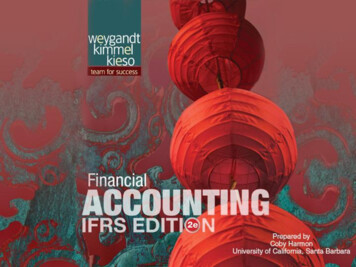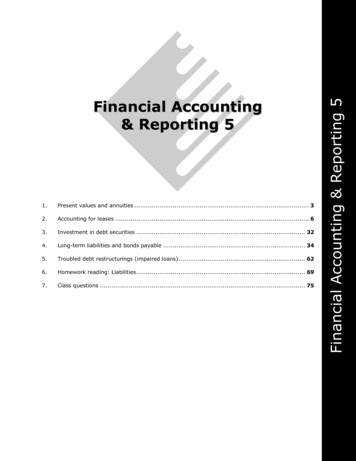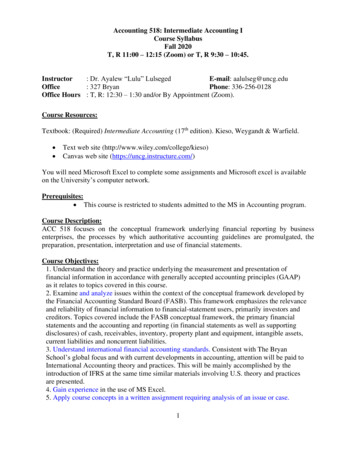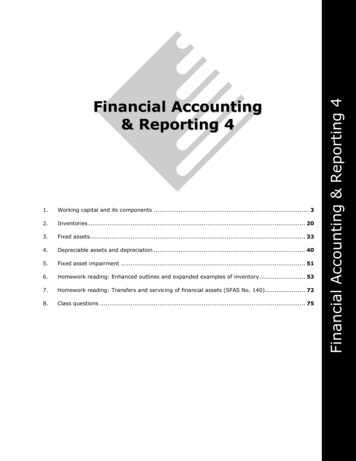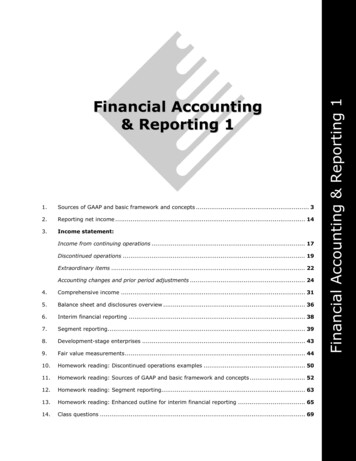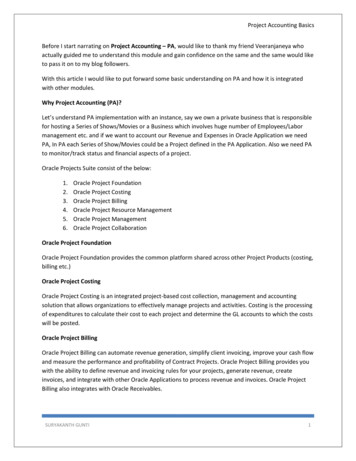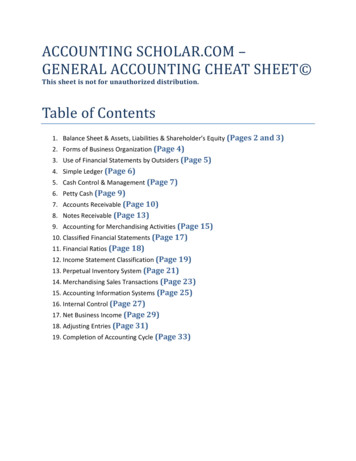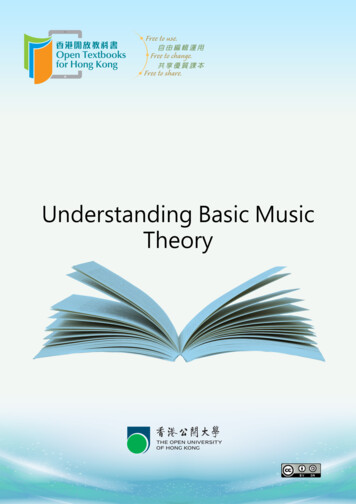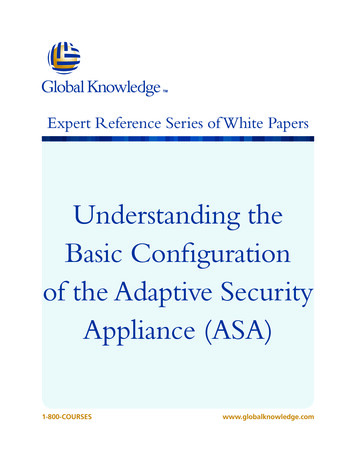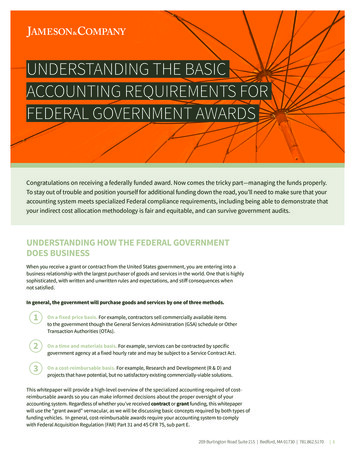
Transcription
UNDERSTANDING THE BASIC ACCOUNTING REQUIREMENTS FOR FEDERAL GOVERNMENT AWARDSUNDERSTANDING THE BASICACCOUNTING REQUIREMENTS FORFEDERAL GOVERNMENT AWARDSCongratulations on receiving a federally funded award. Now comes the tricky part—managing the funds properly.To stay out of trouble and position yourself for additional funding down the road, you’ll need to make sure that youraccounting system meets specialized Federal compliance requirements, including being able to demonstrate thatyour indirect cost allocation methodology is fair and equitable, and can survive government audits.UNDERSTANDING HOW THE FEDERAL GOVERNMENTDOES BUSINESSWhen you receive a grant or contract from the United States government, you are entering into abusiness relationship with the largest purchaser of goods and services in the world. One that is highlysophisticated, with written and unwritten rules and expectations, and stiff consequences whennot satisfied.In general, the government will purchase goods and services by one of three methods.1 n a fixed price basis. For example, contractors sell commercially available itemsOto the government though the General Services Administration (GSA) schedule or OtherTransaction Authorities (OTAs).2 On a time and materials basis. For example, services can be contracted by specificgovernment agency at a fixed hourly rate and may be subject to a Service Contract Act.3 On a cost-reimbursable basis. For example, Research and Development (R & D) andprojects that have potential, but no satisfactory existing commercially-viable solutions.This whitepaper will provide a high-level overview of the specialized accounting required of costreimbursable awards so you can make informed decisions about the proper oversight of youraccounting system. Regardless of whether you’ve received contract or grant funding, this whitepaperwill use the “grant award” vernacular, as we will be discussing basic concepts required by both types offunding vehicles. In general, cost-reimbursable awards require your accounting system to complywith Federal Acquisition Regulation (FAR) Part 31 and 45 CFR 75, sub part E.209 Burlington Road Suite 215 Bedford, MA 01730 781.862.5170 1
UNDERSTANDING THE BASIC ACCOUNTING REQUIREMENTS FOR FEDERAL GOVERNMENT AWARDSCOST-REIMBURSABLE AWARDS AND THEREQUIREMENTS THAT COME WITH THEMCost-reimbursable awards come from a variety of agencies, in a number of sizes, and withstandard and unique reporting requirements. If you have a federal contract or grant containingFAR clause 52.216-7 Allowable Costs, the award is a cost-reimbursable-type funding vehicle. Ina DoD contract, this clause is easy to spot in a 2 or 3 page list of FAR clauses that your award issubject to–in a document that is typically 30 pages or longer.For NIH and DOE grants, this clause is trickier to find. A Notice of Grant Award (NOA) typicallycomes as a 3 or 4 page PDF which takes you to the specific agency’s supplemental regulations.As an example, NIH Award term and conditions are embedded in a hyperlink to http://grants.nih.gov which ultimately takes you to 45 CFR 75, subpart E. DoE Awards drive you to ecfr.gov. Thesecost-reimbursable awards are typically subject to three levels of regulations:Level 1If you’ve received one of these awards, you’ll need to establish an acceptable accountingsystem and maintain it in an “always audit-ready” manner. Regardless of the exact type of federalaward vehicle, all are subject to the accounting and administrative requirements and guidancecontained in the Federal Acquisition Regulation (FAR) and Cost Accounting Standards (CAS).Level 2Each government agency has the right to issue its own supplemental regulations. TheDepartment of Defense, National Institutes of Health, and Department of Energy all havesubstantial supplemental regulations.Level 3Different types of program awards may carry specialized funding vehicle regulations. Asan example, the SBIR program requires certain ownership requirements, and the PrincipalInvestigator (PI) must be primarily employed from the entity receiving the award. ARPA-E’stypically carry cost-sharing requirements that are generally not found in SBIRs.As a basic overview, this whitepaper only addresses “Level 1” subject matter—generaloverview accounting and administrative requirements required by the FAR and CAS.The following types ofprogram awards almostalways have FAR 52.216-7embedded in the termsand conditions of theiraward: BARDA ARPA-E IDIQ BAA SBIR/STTR Phase II R01/U01/R21The Bottom Line NIH SBIR/STTR Phase I*The government is willing to pay for all fair and reasonable costs within the constraints oftheir guidelines. In general, you will need to know whether a cost is allowable (as a director indirect expense) or unallowable. You will need to set up and maintain an acceptableaccounting system. And it is your responsibility to keep meticulous supporting documentationin order to demonstrate your accumulated project costs to a government auditor.JamesonCPA.com209 Burlington Road Suite 215 Bedford, MA 01730 781.862.5170 2
UNDERSTANDING THE BASIC ACCOUNTING REQUIREMENTS FOR FEDERAL GOVERNMENT AWARDSWHY THE GOVERNMENT SEES YOUR AWARDAS HIGH RISKWhen the technical specifications of the work to be done can’t be clearly defined, as is thecase with the majority of R & D projects, the government will typically use a cost-reimbursableaward vehicle. This is considered a high-risk “level of effort” contract because the governmentwill pay the awardee’s cost of performance whether the outcome of the project issatisfactory or not.In most businesses, the higher the risk, the greater the need for oversight. The same is trueof the government. If you have a cost-reimbursable award, you need to understand whichregulations apply to your situation—there are literally thousands of pages. More important,the government does not protect your interests. You do.Is it important tounderstand that withcost-type awards thegovernment has financialrecourse back to you untilall audits are done andthe project is closed-out.Getting this wrong can beextremely expensive.GETTING STARTEDSetting Up Your Accounting SystemWhile some of our clients require more sophisticated systems, low-cost, off-the-shelf softwarepackages such as QuickBooks Online help satisfy the basic accounting requirements that yourgovernment award demands. With a little bit of tweaking, the first key to using this softwarecompliantly, is to properly set up the chart of accounts. This will mean a little bit of tweakingbecause, unfortunately, there isn’t a “government contracting” standard chart of accountoption in QuickBooks online software. We offer the JamesonWorx Phase I Solution whichincludes a basic, starter-level chart of accounts, and the training and reporting capabilities youwill need.Setting Up the Right Chart of AccountsYour chart of accounts is a list of all the accounts used to organize your business financialactivity into different groupings of assets, liabilities, income and expenses. The numbering ofyour accounts is strongly recommended as it creates a simple, consistent cost coding language,and assists in creating a cost charging language throughout your organization. If set up correctly,your chart of accounts will streamline your ability to accumulate and report on costs, and saveyou hours of guesswork and headaches hunting down explanations from your employees.Your monthly government billings and annual incurred cost submission are generated fromdetailed, concise job cost reports. The chart of accounts forms the foundation for gatheringall this information. When the government auditors arrive, your paperwork needs to clearlydocument the expense incurred, and the supporting documents must authenticate thetransaction and approval process. Being audited is not storytelling time or a time to fumblearound looking for answers!JamesonCPA.com209 Burlington Road Suite 215 Bedford, MA 01730 781.862.5170 3
UNDERSTANDING THE BASIC ACCOUNTING REQUIREMENTS FOR FEDERAL GOVERNMENT AWARDSManage Your Expense Charge Coding and DocumentationThe next step in demonstrating your acceptable accounting system to a government auditor is theongoing ability to segregate the expenses in your general ledger as either Allowable (governmentwill reimburse you for these) or Unallowable (they will not.)Allowable CostsUnallowable CostsDIRECT COSTSAny costs for goods or services that are specifically and only forthe benefit of ONE government (or commercial) project, such as: Direct Labor: As an example, the cost of severalhours that an engineer spends performing anexperiment that benefits one specific projectExpenses that the government specificallywill not reimburse you for as they do not derivebenefit from these costs. Examples include,but are not limited to:AlcoholFirst class travel (costs in excess of per diems)Direct MaterialsFederal income taxesDirect Subcontractor CostsDonationsFines, penalties, late feesINDIRECT COSTSAny costs for goods or services that benefit multiple projectsare indirect expenditures such as:UtilitiesIndirect labor, including vacation, holiday and sick timeAdministrative labor costsAccounting feesTelephone and internet expensesRent (assuming you don’t have specialized facilities)Some legal feesJamesonCPA.com209 Burlington Road Suite 215 Bedford, MA 01730 781.862.5170 4
UNDERSTANDING THE BASIC ACCOUNTING REQUIREMENTS FOR FEDERAL GOVERNMENT AWARDSThe classification and coding of expenses are critical and can be confusing at times. Whilesome costs are black and white, others may fall into gray areas. In these situations, a good lineof reasoning is to ask yourself:?If it weren’t for this project, would we have incurred this expense?Which projects benefit from incurring this expense?In general, costs that only benefit a specific project are direct expenses and costs that benefit “thebusiness” are indirect expenses. Our experience shows that 98.3% of new grantees and contractorsdramatically underestimate their indirect costs. More important, they fail to understand that thegovernment prefers to do business with companies who continue to advance their resourcesand solutions. (Which requires you to not shortchange your infastructure.)Keeping Close Track Of Labor Costs—Timesheets Are Mandatory.Labor costs are usually THE largest expense for R & D projects. This is not lost on the government.As such, the government mandates that every employee who works in your company that youcharge the government for, either directly or indirectly, needs to maintain a timesheet. Thesetimesheets must include all of the active projects that your employees are working on, bothgovernment and commercial, as well as charge categories to account for indirect labor, suchas vacation, holidays, sick and administrative time.It is also a FAR requirement for your company to have the following written timekeeping policy:Timesheets must be prepared in inkEmployees must record all time spent (even if in excess of 40 hours/week)Employee must sign off on all timesheets and must get their supervisor’s approval Any corrections must be handled as follows–do not erase anything, draw a line throughany errors and write in the correct information, initial and date the correctionIn practice, your time-tracking system can be either manual (paper) or electronic. The governmentdoesn’t make blanket approvals for commercially-available electronic time-keeping systems.However, to be considered acceptable by a government auditor, an electronic system mustprovide a date-stamped audit log for all data entry including changes and approvals—whicheffectively creates a forensic trail.Obviously, the government doesn’t want anyone to manipulate the employee’s actuallabor costs.When grantees are just getting their business started we typically advise them to simply paythemselves an hourly rate for all their recorded time. Paying salaries introduces the possibilityof uncompensated overtime, which can complicate matters. Checkout our blog series onthis topic.JamesonCPA.com209 Burlington Road Suite 215 Bedford, MA 01730 781.862.5170 5
UNDERSTANDING THE BASIC ACCOUNTING REQUIREMENTS FOR FEDERAL GOVERNMENT AWARDSJob Cost ReportingAll of your expenses must be accumulated in your general ledger (with the assistance of agood chart of accounts) and must reconcile with your job cost reports, a form of subsidiary (oradditional) ledger. Job cost reports are critical for internal decision making, as well as externalreporting requirements and will: Act as support for billing the government for incremental monthly project costsaccumulated Be used to report cumulative spending by budget category to your customers whichthey use to monitor against technical progress achieved on the goals of the project Provide a signal to management when to wrap up a project to prevent overspendingIndirect Cost ReportsIndirect costs come from expenses that relate to your overall business, which aren’t incrementallycaused by specific projects. They include electricity, rent, accounting and telephone expenses.These costs indirectly benefit all of your projects and need to be proportionally allocated, chargedand “paid for” by all of your projects—government and commercial alike. If they all benefit fromthe rent, they should all pay for it.All projects pay for these costs via an indirect cost recovery rate. Your indirect cost rate recoverymethodology is what you believe to be the most fair and equitable way to proportionally chargethese costs to all your customers on an ongoing basis. Once per year, the government requires youto prepare an incurred cost submission or “true up “ report, which reconciles provisional monthlyindirect cost rate charges with actual indirect expenses.Just because a government agency creates a cost proposal template in a certain terminologyformat does not mean you must adhere to their format! You need to determine the best methodologyfor recovering your indirect costs—especially if you are doing business with multiple agencies. Weare typically advocates for keeping it as simple as possible.JamesonCPA.comDifferent governmentagencies will refer toindirect costs using slightlydifferent terminologyfringe, fringe and F&A rates,overhead rates, overheadand G&A rates. These termsand their prescribed usein cost proposal formsare nothing more thanmethodology nomenclaturecommon to that agency.209 Burlington Road Suite 215 Bedford, MA 01730 781.862.5170 6
UNDERSTANDING THE BASIC ACCOUNTING REQUIREMENTS FOR FEDERAL GOVERNMENT AWARDS98.3% Underestimate Their Indirect Cost RateThe indirect cost recovery rate that you propose to the government should represent the indirectcosts that you need to fairly reimburse yourself for indirect expenses—that is your right. However,many companies underestimate this rate when they propose projects and do not charge thegovernment anything resembling their actual rates because the competition for governmentfunding is intense. We also frequently hear “we want to spend as much money as possible ondirect cost that can develop the technology,” which is admirable.While undercharging the government for indirect expenses is legal, it is expensive as it leads toguaranteed project cost losses that need to be paid for somehow, and it may or may not be agood strategic idea. (The government will certainly not stop you from giving them a good deal.Conversely, if you overbill them they will require swift repayment of the overbilling.) If you do nothave equity backing or an extremely profitable commercial revenue stream, underchargingfor your actual indirect costs can be a swift and for certain real road to financial ruin.For additional information on how to project the right indirect cost rate for your business, look inthe resources section on our website, www.jamesoncpa.com.Cost-reimbursable Awards Mean Annual Incurred Cost SubmissionsRegardless of whether you ask for an indirect rate that is too low out of gallantry, cowardice, or apurposeful strategic management decision—you are never excused from calculating your actualindirect rates on an annual basis or properly reporting them. Each government agency has aslightly different approach to indirect cost rate negotiations. However, the annual incurred costsubmission is one of the key historic reports used to negotiate your final indirect cost rate.The presence of FAR 52.216-7 in the terms and conditions of your contract or notice of grant awardmeans you have a cost-reimbursable award. When you initially propose the project, you requestan indirect cost rate in order to provisionally (temporarily) invoice the government on a monthlybasis. The annual incurred cost submission is effectively a true-up report you must prepare whichshows how you calculate your final, actual indirect cost rate. Once submitted you are required toreimburse the government for any indirect costs overbilled.Each agency has slightly different Incurred Cost Submission reporting requirements. To understand how involved this report is, please visit DoD page under the Agency Compliance section ofour website or click here. In addition, we’ve highlighted variations in the reporting requirementson the NIH and DoE webpages.JamesonCPA.com209 Burlington Road Suite 215 Bedford, MA 01730 781.862.5170 7
UNDERSTANDING THE BASIC ACCOUNTING REQUIREMENTS FOR FEDERAL GOVERNMENT AWARDSGovernment AuditsPoor audit outcomes can result in delays in paying invoices, termination and repatriation offunding and, in the worst case, criminal and civil indictments. The depth of this topic is far toocomplex for this basic white paper. We’ve created an additional white paper titled, “Understandingthe Strings Attached to Your Grant Award” for grant awardees which can be downloaded atwww.jamesoncpa.com.UNDERSTANDING THESTRINGS ATTACHED TOYOUR GRANT AWARDGETTING THE HELP YOU NEEDWHAT YOU NEED TO KNOW ABOUT CPAsWhen you think accounting and audits, you probably think of your CPA. In general, CPAs arehighly-educated licensed individuals who are well-versed in Generally Accepted AccountingPrinciples (GAAP). Today, becoming a CPA generally requires a Masters’ degree, passing a multiday uniform exam, and at least two years of public accounting experience.GAAP is the underlying business language used to produce financial statements. GAAP financialstatements are used internally by management in making short and long-term decisions andimproving business performance, and externally by investors and creditors in making investingand lending decisions. GAAP provides guidance on accounting for routine and non-routinetransactions such as revenue recognition. A strong understanding of GAAP is fundamentalto government grants and contract accounting.The Internal Revenue Code, on the other hand, is the framework for corporate and individualincome tax regulations. It is critical to a business. Because of this, management frequently turnsto their tax CPA first. Tax knowledge, however, is almost completely irrelevant to workingwith the cost accounting standards of Federal Acquisition Regulations.JamesonCPA.com209 Burlington Road Suite 215 Bedford, MA 01730 781.862.5170 8
UNDERSTANDING THE BASIC ACCOUNTING REQUIREMENTS FOR FEDERAL GOVERNMENT AWARDSWhat level of accountant do you need?Whether you decide to outsource your accounting or do it in-house, there are expenses involved.Accounting compensation is driven by years of experience, specialized knowledge certificationsand location.Below you’ll find salaries for various accounting positions based on figures from salary.commedian pay ranges; if you want a superstar, be prepared to pay in the 80th -90th percentiles.Depending on your location, these amounts need to be adjusted up or down based on the cost-ofliving adjustment for your location. As an example, if you are in New York City or San Francisco andwant someone physically present, be prepared to add 40% for a cost-of-living adjustment.Additionally, if you fill this role with an employee, rather than a contractor, budget an additional25-39% for benefits—depending on how generous your benefits package needs to be to findqualified people. Bookkeeper and administrative types with an Associate’s Degree can typically pay billsand process routine transactions. They’re usually paid 35- 60 per hour depending onexperience and can be quite adequate in businesses with revenues of less than 5M. Formost of our clients of this size, QuickBooks Online experience will be essential. Full-charge accountants with a Bachelor’s of Science Degree in Accountancy becomemore appropriate when the volume and complexity of transactions within the businessincrease, typically to 3- 10M per year. Salaries usually range from 80,000 to 100,000per year (plus benefits) for this level of expertise. However, the complexity of anycommercial operations and need to interact regularly with customers, VCs, or boardmembers could challenge this level of expertise in smaller businesses. What’s more,while degreed accountants tend to be good at maintaining a GAAP set of books and canbe taught most routine accounting duties, they don’t know what they don’t know. Accounting Controllers usually have five to seven years of experience. Still, theymay struggle when working in unfamiliar territory. Salaries range from 100,000 to 125,000 per year. Add the comfort factor provided by the CPA license certification andthe reduced risk can push the salary to 120,000 to 160,000 (plus benefits). Theseindividuals typically become essential when revenues hit 10M or the demands ofcustomers, VC boards, or commercial operations dictates. Chief Financial Officer (CFO): Publically-traded companies, or companies with significantoutside investor relations and board oversight, tend to dictate the need for this level ofperson, who will command a minimum of 200,000 to 250,000 per year (plus benefits)and will have at least 10 to 15 years of related experience. CFOs can do it all and tend tostick to mission-critical issues and oversee a staff to perform the rest.JamesonCPA.comA. Degreed accountantstend to be good atmaintaining a GAAP set ofbooks and can be taughtmost routine accountingduties, but don’t knowwhat they don’t know.B. Controllers are moresophisticated thandegreed accountants, butmay still struggle whenoutside their comfortzone.CFO’s can do it all tend tostick to mission criticalissues and oversee a staffto perform the rest.209 Burlington Road Suite 215 Bedford, MA 01730 781.862.5170 9
UNDERSTANDING THE BASIC ACCOUNTING REQUIREMENTS FOR FEDERAL GOVERNMENT AWARDSDo You Have The Right Kind Of CPA?Government contract and grant accounting is a rare specialty and, in truth, is outside the realm ofknowledge of an ordinary CPA. It is not something an accountant would learn in school, nor is itcovered in the Uniform CPA Examination.At Jameson, our Account Managers are typically CPAs with 15 years of public accountingexperience and they usually need about 5,000 to 6,000 hours of government award managementexperience with us before we will let them represent a client during a government audit without asupervisor present. The stakes are just too high!How To Tell If Your Accountant Is Qualified to Handle Your NeedsWhile knowledge of GAAP is the baseline for applying the specialized rules of FAR, it is only thebeginning. There are many nuances to FAR accounting that can only be learned in the trenches.To see the person overseeing your financial relationship with the federal government is qualified,asking the following: Do you know what the salary cap is for our funding agency?While the exact number generally changes annually, not having a rough idea– withoutlooking it up– is very telling.12 How many indirect cost rates have you negotiated?Final indirect cost rates are negotiated during the government’s audit of your IncurredCost Submission. Would you pick a knee surgeon for your operation who only had threesuccessful operations or would you prefer someone who has performed hundreds?3 How do the indirect cost rates we use in our proposals compare with the industry?For the answer to this question, see the Resources section of our website.Yes, there are all sorts of competent individuals who can help you with your business.But the question remains, are they qualified to help you with your government contractand grant accounting? And what is the most cost effective mix?JamesonCPA.com209 Burlington Road Suite 215 Bedford, MA 01730 781.862.5170 10
UNDERSTANDING THE BASIC ACCOUNTING REQUIREMENTS FOR FEDERAL GOVERNMENT AWARDSSUMMARYReceiving a cost-reimbursable award can be a real game changer. But there are strings attached inthe form of reporting and accounting requirements specified in the Federal Acquisition Regulationsand Cost Accounting Standards.There are also requirements which are unique to different government agencies, and even thedifferent types of funding vehicles. Audit findings, penalties, future funding, even the originalaward itself is riding on your accounting practices, so you have to get it right.To avoid expensive surprises, find an expert with a proven track record of working with governmentgrants and contracts. Whether you decide to handle the accounting in house or outsource, makesure the person who oversees the care of your books and records, and represents you during thesegovernment audits understands the rigors of this type of accounting.Know MoreIf you’d like to learn more about Jameson & Company CPAs, our team, experience and solutions,visit our website, www.jamesoncpa.com.If you’d like to talk about your government grant or contract and how we can help,contact Ryan Remington at:781.862.5170, ext. 2106ryan@jamesoncpa.comJameson & Company CPAs deliver proven accounting services custom designed for entrepreneurs who have been awardedFederal contracts and grants with annual revenues of up to 10 Million. We provide the skills and processes you must have tomaintain a FAR compliant accounting system. We’ve successfully represented clients during thousands of DCAA audits, NIH indirectrate negotiations and audits by other government agencies. We manage your accounting system so you have more time to innovate.We’ve helped clients manage over 4 billion in Federal awards – fairly, cost effectively, from coast to coast.JamesonCPA.com209 Burlington209 BurlingtonRoad SuiteRoad215Suite Bedford,215 Bedford,MA 01730MA 01730781.862.5170 781.862.5170 11
UNDERSTANDING THE BASIC ACCOUNTING REQUIREMENTS FOR FEDERAL GOVERNMENT AWARDS Manage Your Expense Charge Coding and Documentation The next step in demonstrating your acceptable accounting system to a government auditor is the ongoing ability to segregate the expens


